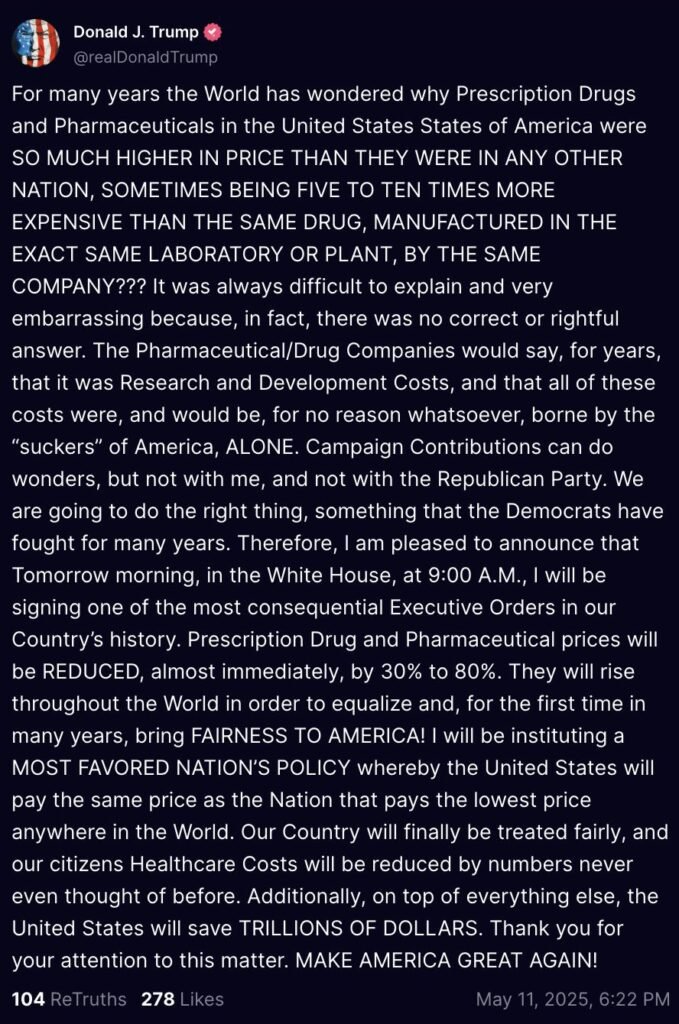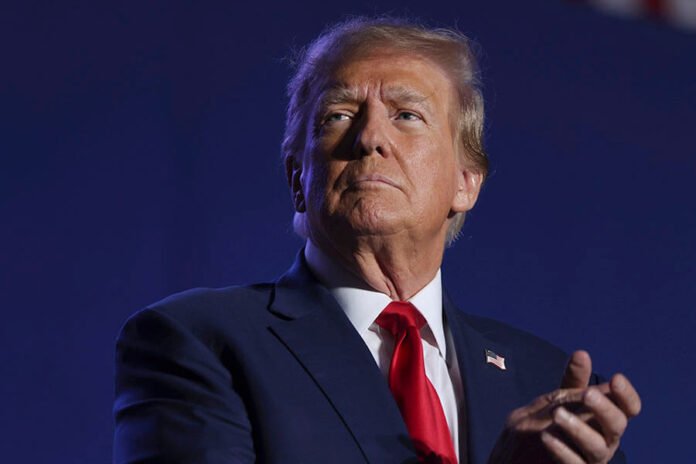U.S President Donald Trump has announced new policy changes relating to prescription drug administration in the U.S.
Trump has promised a sharp reduction in prescription drug prices for American consumers. But experts say the move may shift financial pressure onto countries like Nigeria, which depend heavily on imported medicines.
In a post on Truth Social, Trump said he would sign an executive order that cuts U.S. drug prices by up to 80%.
“We are going to reduce prescription drug prices by 30% to 80%,” he wrote. “Americans should not pay more than people in other countries.”
The executive order will introduce a “Most Favoured Nation” clause. This means the U.S. will pay the lowest global price available for a drug.

Trump also blamed pharmaceutical companies for what he called unfair global pricing.
“Big Pharma forces American patients to cover global research costs,” he added. “We are ending that injustice.”
Nigeria’s Heavy Reliance on Imported Drugs
Nigeria imports over 70% of its pharmaceutical products, mainly from India, China, the U.S., and parts of Europe. Local drug manufacturers supply only 25% of the market.
With a population of over 220 million, Nigeria’s annual healthcare spending is estimated at $10 billion. About $4 billion of that goes toward medicines.
Foreign exchange instability has already made drug importation expensive. The naira continues to weaken against the U.S. dollar, raising costs for medical distributors and retailers.
“We are already struggling to keep stocks available,” said a Lagos-based pharmacist. “If global suppliers increase prices, many Nigerians will suffer.”
President Trump is signing a historic Executive Order to significantly reduce drug prices for Americans.
— Karoline Leavitt (@PressSec) May 12, 2025
This EO will help bypass costly middlemen and bring the prices Americans pay for prescription drugs in line with those paid by other nations.
Other Presidents merely talked… pic.twitter.com/KTD37JonpH
Only a small fraction of Nigerians have health insurance. Out-of-pocket spending makes up 62% of all healthcare expenses. Rising medicine prices will hit ordinary citizens the hardest.
“We pay for everything ourselves,” said Deborah Chukwu, a sickle cell patient in Enugu. “Now my medicine costs more, and the government is silent.”
Diseases That Could Be Affected
Experts warn that expensive branded drugs for chronic illnesses may become more costly. These include treatments for diabetes, hypertension, asthma, cancer, and infectious diseases.
Nigeria also relies on donor-funded medicine programmes. These support the treatment of HIV, tuberculosis, and malaria. Any U.S. policy change affecting pharmaceutical exports or donations could weaken those programmes.
During Trump’s first presidency, several global health partnerships faced delays or cuts. Health advocates fear similar actions could return.
“When the U.S. changes drug policy, the rest of the world feels it,” said Dr. Kemi Obasi, a public health researcher. “We must prepare for the consequences.”
Many patients now turn to social media to raise awareness and share their frustrations. Posts by sickle cell warriors and HIV patients have gone viral in recent days.
“We are barely surviving,” one post read. “Even routine drugs are now luxuries.”
If drug supply shrinks or prices rise, health outcomes in Nigeria could decline further.
Rate, Like 👍, Comment, share this article and Follow us on our social media handles.






